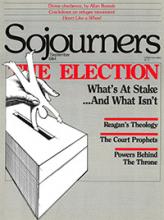P = o + i. Remember that simple formula and you can avoid the confusion of centuries about the principalities and powers, and, just possibly, perceive the deeper meaning of the coming election. The powers (P) are not spiritual spooks inhabiting the air and leaping on the unwary. That was an earlier way of putting it. Nor are they merely institutions, political or economic systems, ideologies, or social structures. That has been the modern way of coming at it. Neither is adequate, though both contain some truth.
The powers consist, it turns out, of an outer manifestation (o) and an inner spirituality (i). Every material or tangible manifestation of power has its inner or spiritual aspect, whether it be the spirit of a team, the morale of a business office, the "corporate culture" of a transnational corporation, or the ethos of a nation.
When Ephesians 6:12 asserts that we are not contending against flesh and blood, that is, the mere human agents put forward by the powers as their visible representatives, "but against the principalities, against the powers, against the world rulers of this present darkness, against the spiritual hosts of wickedness in the heavenly places," it cannot mean by "heavenly places" the sky. Elsewhere the writer indicates that we have already been made to sit with God "in the heavenly places in Christ Jesus" (Ephesians 2:6).
The "heavenlies" are not, then, a physical location but a spiritual dimension of present reality, in which we already share the suffering and victory of Christ. This spiritual dimension is not a place of peace, either; it is the locale of the spiritual forces that attempt to suck the life out of the world, like a moral black hole in the universe.
Read the Full Article

